21.英语歧义句
有歧义的英语句子画树形图
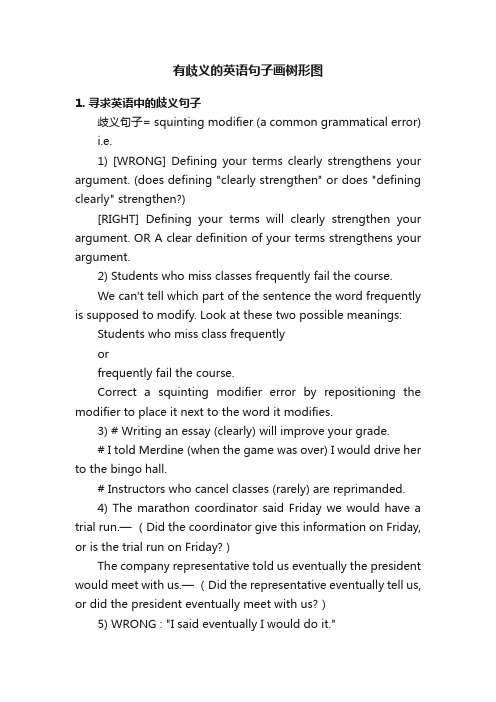
有歧义的英语句子画树形图1. 寻求英语中的歧义句子歧义句子= squinting modifier (a common grammatical error)i.e.1) [WRONG] Defining your terms clearly strengthens your argument. (does defining "clearly strengthen" or does "defining clearly" strengthen?)[RIGHT] Defining your terms will clearly strengthen your argument. OR A clear definition of your terms strengthens your argument.2) Students who miss classes frequently fail the course.We can't tell which part of the sentence the word frequently is supposed to modify. Look at these two possible meanings: Students who miss class frequentlyorfrequently fail the course.Correct a squinting modifier error by repositioning the modifier to place it next to the word it modifies.3) # Writing an essay (clearly) will improve your grade.# I told Merdine (when the game was over) I would drive her to the bingo hall.# Instructors who cancel classes (rarely) are reprimanded.4) The marathon coordinator said Friday we would have a trial run.—(Did the coordinator give this information on Friday, or is the trial run on Friday?)The company representative told us eventually the president would meet with us.—(Did the representative eventually tell us, or did the president eventually meet with us?)5) WRONG : "I said eventually I would do it."RIGHT: "Eventually, I said I would do it"or"I said I would do it eventually."2. 英语里没有语病又有歧义的句子有哪些比如说“Leave the book on the shelf"你可以理解为,把书放在书架上,或者是不要碰书架上的书。
容易产生歧义的英语句子

容易产生歧义的英语句子英语是一门非常灵活且多义的语言,有时候即使是一句简单的句子也会因为词语的多义性或者语法结构的模糊性而产生歧义。
特别是对于非英语母语者来说,理解这些歧义可能会更加困难。
本文将讨论一些在英语中容易产生歧义的句子,并对它们进行分析和解释。
首先,一些词语的多义性经常会导致句子产生歧义。
比如,“I saw her duck”这句话就有两种解释。
一种是“我看到她躲闪”,另一种是“我看到她的鸭子”。
这里的“duck”既可以指动词“躲闪”,也可以指名词“鸭子”,所以句子的真正含义依赖于上下文。
如果没有上下文的支持,那么读者很难确定句子的确切含义。
另一个常见的例子是“Time flies like an arrow.”这句话听起来似乎很简单,但它的意思可以有多种解释。
一种是“时间像箭一样飞逝”,另一种是“时间飞翔喜欢一个箭”,还有可能是“时间像箭一样喜欢飞逝”。
这一句话之所以产生歧义,主要是因为“like”和“an arrow”可以有不同的修饰对象。
所以,要想完全理解这句话的含义,读者需要依赖于上下文或者其他线索。
不仅是词语的多义性,有时候句子的语法结构也会让人产生误解。
比如,“The old man the boats.”这句话看上去是一个简单的陈述句,但它实际含义可能会有不同的解释。
一种可能的解释是“老人管理这些船”,另一种是“这些船老化了”。
这里的歧义主要来自动词“man”的不同解释。
如果“man”被理解为及物动词,那么这句话的意思是“老人管理船只”,如果“man”被理解为名词,那么这句话的意思是“船只老化了”。
对于非英语母语者来说,这种歧义可能会让他们感到困惑。
此外,有时候句子的语态也会让人产生误解。
比如,“The chicken is ready to eat.”这句话看上去似乎没有什么问题,但它的含义可能会有不同的解释。
一种可能是“鸡准备好了,可以吃了”,另一种是“鸡已经准备好了,可以吃了”。
英语歧义句式与疑难词汇练习
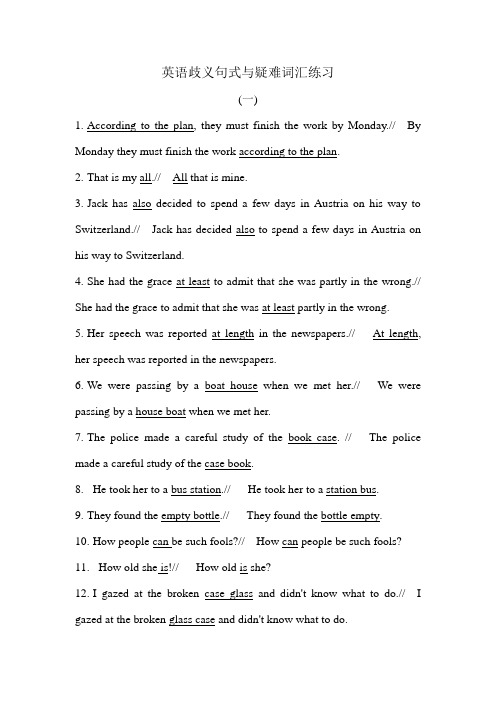
英语歧义句式与疑难词汇练习(一)1.According to the plan, they must finish the work by Monday.// By Monday they must finish the work according to the plan.2.That is my all.// All that is mine.3.Jack has also decided to spend a few days in Austria on his way to Switzerland.// Jack has decided also to spend a few days in Austria on his way to Switzerland.4.She had the grace at least to admit that she was partly in the wrong.// She had the grace to admit that she was at least partly in the wrong.5.Her speech was reported at length in the newspapers.// At length, her speech was reported in the newspapers.6.We were passing by a boat house when we met her.// We were passing by a house boat when we met her.7.The police made a careful study of the book case. // The police made a careful study of the case book.8.He took her to a bus station.// He took her to a station bus.9.They found the empty bottle.// They found the bottle empty.10.How people can be such fools?// How can people be such fools?11.How old she is!// How old is she?12.I gazed at the broken case glass and didn't know what to do.// I gazed at the broken glass case and didn't know what to do.13.He likes this kind of chocolates.// He likes chocolates of this kind.14.He kept her company. // He kept company with her.15.We didn't buy it, did we, because it was cheap.// We didn't buy then because it was cheap, did we?16.It never occurred to her to doubt that the story might be false.// The doubt never occurred to her that the story might be false.17.Can you tell me all you know about a flower garden?// Can you tell me all you know about a garden flower?18.She simply spoke.// She spoke simply.19.Two of my brother's friends came to see him off.// Two friends of my brother's came to see him off.20.The orator made himself generally unpopular with the crowd.// The orator generally made himself unpopular with the crowd.21.Thank you. This is a piece of good advice for me. // Thank you. This is a good piece of advice for me.22.Half a bottle is left. // A half-bottle is left.23.Jim's father gave him half a crown. // Jim's father gave him a half-crown.24.He drank half another cup. // He drank another half-cup.25.He poured himself out a glass of water.// He poured out a glass of water himself.26.She saw him through. // She saw through him.27.He gave him a tip about the horse races. // He gave him a tip about the race horses.28.Only yesterday I met her and discussed the matter with her. // Only yesterday did I meet her and discuss the matter with her.29.She will explain quite clearly in future what she intends to do. // She will explain quite clearly what he intends to do in future.30.She tried in vain to prevent the work from being done.// She tried to prevent the work from being done in vain.。
英语歧义句与翻译
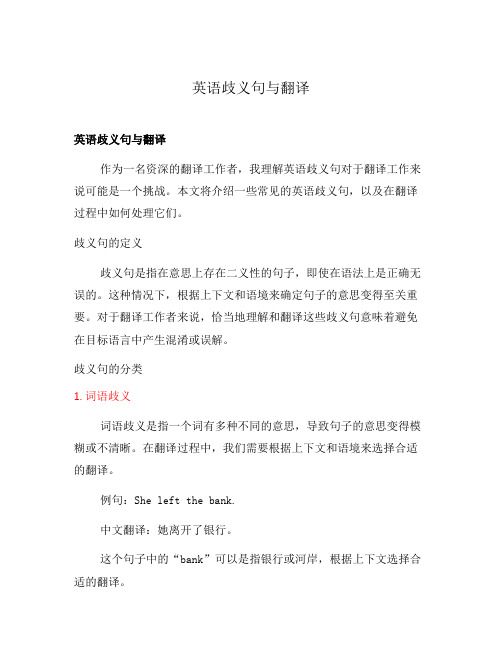
英语歧义句与翻译英语歧义句与翻译作为一名资深的翻译工作者,我理解英语歧义句对于翻译工作来说可能是一个挑战。
本文将介绍一些常见的英语歧义句,以及在翻译过程中如何处理它们。
歧义句的定义歧义句是指在意思上存在二义性的句子,即使在语法上是正确无误的。
这种情况下,根据上下文和语境来确定句子的意思变得至关重要。
对于翻译工作者来说,恰当地理解和翻译这些歧义句意味着避免在目标语言中产生混淆或误解。
歧义句的分类1. 词语歧义词语歧义是指一个词有多种不同的意思,导致句子的意思变得模糊或不清晰。
在翻译过程中,我们需要根据上下文和语境来选择合适的翻译。
例句:She left the bank.中文翻译:她离开了银行。
这个句子中的“bank”可以是指银行或河岸,根据上下文选择合适的翻译。
2. 语法歧义语法歧义是指在句子的结构上存在多种解释的情况。
合理地翻译这种歧义句需要考虑上下文和语境。
例句:I saw the man with binoculars.中文翻译:我用双筒望远镜看到了那个人。
这个句子中的“with binoculars”可以解释为那个人使用双筒望远镜,也可以解释为是我使用双筒望远镜去看那个人。
翻译时需要根据上下文来决定具体含义。
3. 语义歧义语义歧义是指句子的意思在不同的语境下有多种可能的解释。
在翻译过程中,需要根据上下文和目标读者的背景来确定句子的精确含义。
例句:Time flies like an arrow.中文翻译:时间如箭般飞逝。
这句话的意思可以理解为时间像箭一样飞逝,也可以理解为时间飞快地过去,这取决于读者对于表达方式的理解。
处理英语歧义句的技巧在翻译英语歧义句时,以下技巧可能会帮助到翻译工作者:1.仔细阅读全文,理解上下文和语境,以确保正确理解句子的意思。
2.将歧义句与周围的句子联系起来,确定句子的具体含义。
3.如果有可能,与原文作者或其他相关人员进行沟通,以确保准确理解句子的含义。
4.根据目标读者群体的背景和文化差异,选择合适的翻译方式来传达歧义句的意思。
从句法学角度探讨英语歧义句
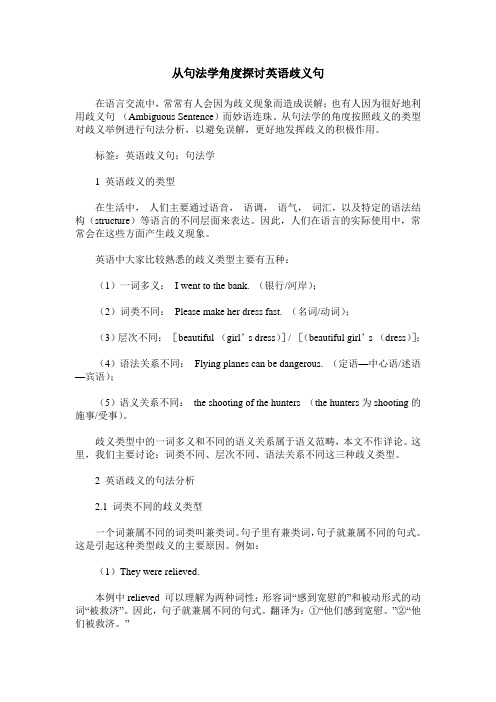
从句法学角度探讨英语歧义句在语言交流中,常常有人会因为歧义现象而造成误解;也有人因为很好地利用歧义句(Ambiguous Sentence)而妙语连珠。
从句法学的角度按照歧义的类型对歧义举例进行句法分析,以避免误解,更好地发挥歧义的积极作用。
标签:英语歧义句;句法学1 英语歧义的类型在生活中,人们主要通过语音,语调,语气,词汇,以及特定的语法结构(structure)等语言的不同层面来表达。
因此,人们在语言的实际使用中,常常会在这些方面产生歧义现象。
英语中大家比较熟悉的歧义类型主要有五种:(1)一词多义:I went to the bank. (银行/河岸);(2)词类不同:Please make her dress fast. (名词/动词);(3)层次不同:[beautiful (girl’s dress)]/ [(beautiful girl’s (dress)];(4)语法关系不同:Flying planes can be dangerous. (定语—中心语/述语—宾语);(5)语义关系不同:the shooting of the hunters (the hunters为shooting的施事/受事)。
歧义类型中的一词多义和不同的语义关系属于语义范畴,本文不作详论。
这里,我们主要讨论:词类不同、层次不同、语法关系不同这三种歧义类型。
2 英语歧义的句法分析2.1 词类不同的歧义类型一个词兼属不同的词类叫兼类词。
句子里有兼类词,句子就兼属不同的句式。
这是引起这种类型歧义的主要原因。
例如:(1)They were relieved.本例中relieved 可以理解为两种词性:形容词“感到宽慰的”和被动形式的动词“被救济”。
因此,句子就兼属不同的句式。
翻译为:①“他们感到宽慰。
”②“他们被救济。
”(2)John was offended.同样,本例中offended可以理解为两种词性:形容词“感到生气的”和被动形式的动词“被冒犯”。
谈英语中歧义句类型
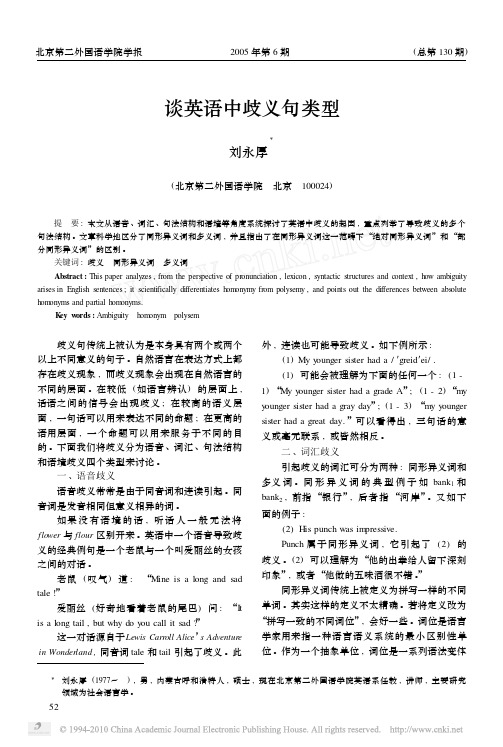
(2) His punch was impressive. Punch 属于同形异义词 , 它引起了 (2) 的 歧义 。(2) 可以理解为 “他的出拳给人留下深刻 印象”, 或者 “他做的五味酒很不错 。” 同形异义词传统上被定义为拼写一样的不同 单词 。其实这样的定义不太精确 。若将定义改为 “拼写一致的不同词位”, 会好一些 。词位是语言 学家用来指一种语言语义系统的最小区别性单 位 。作为一个抽象单位 , 词位是一系列语法变体
三 、句法结构歧义 在讨论句法结构引起的歧义之前 , 让我们先 看下面几个例子 :
(4) The boy was seated by the teacher. (4) 是个歧义句 。如果 by 的意思是 “在. . . 旁边”的话 , 句子的意思就是 “那个男孩坐在了 老师的旁边 。”如果 by 在句中用来引导动词 seat 的实施者 , (4) 的意思就变成了 “老师让那个男 孩坐下了 。”
歧义句传统上被认为是本身具有两个或两个 以上不同意义的句子 。自然语言在表达方式上都 存在歧义现象 , 而歧义现象会出现在自然语言的 不同的层面 。在较低 (如语言辨认) 的层面上 , 话语之间的信号会出现歧义 ; 在较高的语义层 面 , 一句话可以用来表达不同的命题 ; 在更高的 语用层面 , 一个命题可以用来服务于不同的目 的 。下面我们将歧义分为语音 、词汇 、句法结构 和语境歧义四个类型来讨论 。
(1) 这些词在意义上无关联 ; (2) 其语法变 体都是相同的 ; (3) 相同的语法变体在语法上是 对等的 。(Lyons 2000 : 55)
容易产生歧义的英语句子

容易产生歧义的英语句子
英语是一门非常复杂的语言,有时候同样的一句话可能由于语法、词义等方面的不同而产生歧义。
以下是一些容易产生歧义的英语句子: 1. 'I saw her duck.' 这句话可能被理解为“我看到她躲避”,也可能被理解为“我看到她鸭子”。
2. 'I shot an elephant in my pajamas.' 这句话可能被理解
为“我穿着睡衣打了一只大象”,也可能被理解为“我在大象睡衣里
开枪”。
3. 'Time flies like an arrow; fruit flies like a banana.' 这句话可能被理解为“时间像箭一样飞逝;水果像香蕉一样飞”,也
可能被理解为“时间像一只箭射向水果;水果像一只香蕉被飞”。
4. 'I refuse to eat the cheese unless it's blue.' 这句话可能被理解为“除非奶酪是蓝色的,否则我拒绝吃”,也可能被理解
为“我拒绝吃奶酪,因为它有蓝色的霉菌”。
5. 'I saw the man with the binoculars.' 这句话可能被理解为“我看到一个带着双筒望远镜的男人”,也可能被理解为“我在双
筒望远镜里看到了一个男人”。
以上这些句子可能会在不同的场合产生歧义,因此在进行英语交流时要注意语法和语境,以免造成不必要的误解。
- 1 -。
词汇歧义[整理]
![词汇歧义[整理]](https://img.taocdn.com/s3/m/f03fa01bbb1aa8114431b90d6c85ec3a86c28b53.png)
词汇歧义(1)They can fish.当解释成他们会钓鱼时“can”是情态动词,“fish”是不及物动词,此句说的是一种能力。
当解释成他们做鱼罐头时,我们把“can”看成是及物动词,“fish”是名词。
由于“can”和“fish”都有两个词性,而且在这个句子中都能讲得通,因此产生了两种不同的解释。
(2)You will forget tomorrow.当解释成明天你就会把一切都忘记时,“tomorrow”是副词,当解释成你会忘记明天发生的一切时,“tomorrow”是名词。
air n. 交易会 a. 公平合理的 fare n. 车船费 vi. 进展;过活 He brought the piglets to the fair to sell.他把小猪赶到集市上卖. Everybody must be given a fair share of the harvest.每个人得到的粮食数量应该是均等的. How much is the air fare to Tianjin?到天津的飞机票要多少钱? How did you fare in New York? 你在纽约过得怎么样? 2. principle n. 原理;原则 principal a. 主要的Mr. Connors believes that truthfulness is the best principle. 克诺斯先生认为真理才是最好的原则. The scientist was the principal speaker at the meeting. 那位科学家是会议上的首要发言者. 3. coarse a. 粗糙的;粗鲁的;粗俗的 course n. 路线;课程His coarse manners deserve to be criticized.他粗鲁的行为应该受到责备. Highway across the country is in course of construction. 横贯该国的一条公路正在建设之中. The president encouraged the students to take more courses. 校长鼓励学生们多修几门课程. 4. complement n. 补充物;使完备之物 compliment n. 恭维;问候 Lively conversation is a complement to a party. 欢快的谈话有助于聚会的气氛. Give my compliments to your mother. 请代我向你妈妈问好. Thank you for your compliments. 谢谢您的夸奖. 5. council n. 委员会;理事会 counsel n. 商议;劝告v. 建议;劝告 The U.N. Security council consists of five countries.联合国安理会由五个国家组成. My father gave me a wise counsel and I followed it.父亲给我的忠告很明智,所以我听取了他的忠告. His brother counseled him to think carefully before making a decision. 他哥哥建议他做决定之前仔细考虑. 6. stationary a.固定的;静止的 stationery n. 文具 The weatherman said that the warm front would be stationary for several days. 气象预报员说,暖锋将停滞数天不移动. Lucy wrote to her mother on the company's stationery. 露西用公司的信笺信封给妈妈写信. 7. peace n. 和平;安宁 piece n. 块;片;篇章;条 Peace was restored after a week of disturbance. 经过一周的骚乱又恢复了平静. Duke ate a piece of chocolate cake for dessert. 杜克用甜食时吃了一块巧克力. 8. desert v. 丢开;遗弃;开小差 dessert n. 餐后甜点 After deserting his post the soldier ran away from the camp. 那个战士从帐篷弃职而逃. We had apple pie for dessert last night.我们昨晚吃的甜食是苹果. 9. weather n. 天气;气象; whether conj. 是否;不管 Our flight was delayed because of unfavorable weather. 因天气问题,我们的航班晚点了. We do not know whether we will go away for our vacation or stay home. 是出外度假还是呆在家里我们一时拿不定主意. 10. lightning n. 闪电lightening n. 轻松;减轻;发亮 The tall tree on the bank was struck by lightning. 岸边的高树遭了雷劈. Mr. Blare was invited to be in charge of lightening of stage. 布莱尔先生被邀负责舞台的灯光设计. My heart began lightening when hearing the good news. 听到这个好消息我的心情开始轻松了A heteronym is a "word having a different sounding and meaning but the same spelling." (minute - unit of time; minute - very small) 1. address My address is Easy Street. She will address the crowd. 2. bow She wears a bow in her hair. Bow to the audience at the end. 3. close Please close the door. She sat close tohim. 4. content The content of the talk is simple. I am content to just stay home. 5. convert She is a convert to exercise. She will convert the machine. 6. digest You will digest your food in time. I never read Reader's Digest. 7. dove She dove into the water. The dove makes a cooing sound. 8. invalid She was an invalid in the hospital. Your license is invalid. 9. lead He will lead the parade. The metal lead is very heavy. 10. live Where do you live? It was a live snake. 11. minute I'll be with you in just a minute. The insect had minute legs. 12. object It was a valuable object. We would object if she went. 13. present We got a nice present from her. She will present the awards to all. 14. project Is your science project done? Project the movie on the screen. 15. read She likes to read books. She read a story to the boy. 16. record Let's record that movie. She bought a record album. 17. row The kids were all sitting in a row. They had a row over the noise. 18. sow We shall sow the wheat today. The old sow was in the pigpen. 19. subject The subject of my talk is autos. They will subject them to torture.20. tear Don't shed a tear for her loss. Don't tear the photograph. 21. wind The wind blew strong last night. Wind the string on a stick. 22. wound He received a bullet wound. He wound up the rope. [/face][/size]tear [tie] 眼泪 tear [tie] 撕裂 sow [seu] 播种 sow [sau] 母猪 minute [minit] 分钟 minute [mai nju:t] 微小的还有:abstract, accent, affix, attribute, augment, compound, com-press, concert, conduct, confine, conflict, conscript, consort, construct, contest, contract, contrast, converse, convert, convict, de-crease, detail, digest, discard, discount, discourse, escort, export, extract, ferment, forecast, import, impress, incline, increase, insult, object,perfume, permit, pervert, prefix, present, produce, progress, protest, rebel, record, refill, re-fix, refund, regress, reject, segment, subject, suffix, survey, suspect, torment, trans-form, transplant, transport, upset。
- 1、下载文档前请自行甄别文档内容的完整性,平台不提供额外的编辑、内容补充、找答案等附加服务。
- 2、"仅部分预览"的文档,不可在线预览部分如存在完整性等问题,可反馈申请退款(可完整预览的文档不适用该条件!)。
- 3、如文档侵犯您的权益,请联系客服反馈,我们会尽快为您处理(人工客服工作时间:9:00-18:30)。
句法歧义(syntactic ambiguity)
介词短语、从句、形容词和副词在句中由 于修饰作用或修饰关系的变化引起的歧义 • The English history teacher is having her tea. a) The teacher of English history is having her tea. (英国历史教师) b) The history teacher who is English is having her tea. (英籍历史教师)
句法歧义(syntactic ambiguity)
动词的-ing形式有时作名词的定语,有时当动名词作主语 、表语,有时组成进行时态,因而引起句子歧义。 • Smoking grass can be nauseatiபைடு நூலகம்g. a) Grass which is smoking can be nauseating. (冒着烟的草) b) It can be nauseating to smoke grass. (抽草烟) • They are moving sidewalks.
句法歧义(syntactic ambiguity)
由状语引起的歧义 I saw John in the bus. 句中,地点状语in the bus使该句产生歧义, 可以有以下三种解释: a) I saw John while I was in the bus. b) I saw that John was in the bus. c) I saw John while we were both in the bus.
句法歧义(syntactic ambiguity)
句法歧义(syntactic ambiguity)
动词的-ing形式有时作名词的定语,有时当动名 词作主语、表语,有时组成进行时态,因而引起 句子歧义。 • Flying planes can be dangerous. flying可以有两种解释:一种是把flying看作现在 分词,在句中修饰名词planes, flying planes是句 子的主语。此时,该句相当于:Planes that are flying can be dangerous.(飞行中的飞机是可能 有危险的。)另一种是把flying看作动名词,即 flying planes是动名词短语,在句中作主语。此时 该句相当于:To fly planes can be dangerous.(驾驶飞机可能是危险的。)
句法歧义(syntactic ambiguity)
非谓语动词在句子中既有主动意义,又有被动意义;既可 作定语、复合宾语,又可作状语,因而引起句子之歧义 • I saw a boat pulling a fishing net. a) I saw a boat which was pulling a fishing net. (一只拖渔网的船) b) I saw that a boat was pulling a fishing net. (一只 船在拖渔网) c) I saw a boat when I was pulling a fishing net. (我在拉渔网)
句法歧义(syntactic ambiguity)
非谓语动词在句子中既有主动意义,又有被动意义;既可 作定语、复合宾语,又可作状语,因而引起句子之歧义 • The police were ordered to stop drinking by midnight. a) The police were told to stop other people from drinking by midnight. (命令警察禁止人们在午夜 喝酒) b) The police were told to stop their own drinking by midnight. (命令警察不准在午夜喝酒)
词汇歧义(lexical ambiguity)
因一词多义或同形异义而引起的歧义 • 一词多义及同形异义引起的歧义在英语中 很常见。请看下面的句子: • (1) Let me drive you to the bank. (bank可以指“银行”,也可以指“河岸”) • (2) He is drawing a cart at the moment. (drawing可以表示“画”,也可以表示 “拉”)
英语歧义句
歧义产生的因素
• 英语中的歧义现象涉及许多因素,但简单说 来,主要源于两个方面:词汇和句法结构。相 应地,歧义句可以分为词汇歧义句(lexically ambiguous sentence)和句法歧义句 (syntactically/grammatically ambiguous sentence )两大类。
句法歧义(syntactic ambiguity)
非谓语动词在句子中既有主动意义,又有被动意义;既可 作定语、复合宾语,又可作状语,因而引起句子之歧义 • He wants a girl to finish the work on time. a) He wants a girl who will finish the work on time. (一个能完成这项工作的女孩) b) He wants a girl in order that she will finish the work on time. (叫一女孩完成这项工作) c) He wants a girl in order that he can finish the work on time. (他为了完成这项工作而需要一女孩)
a) b) They are sidewalks which can be moved. (能移动的人行道) They are in the act of moving sidewalks. (他们在移动人行道)
句法歧义(syntactic ambiguity)
动词的-ing形式有时作名词的定语,有时当动名词作主语 、表语,有时组成进行时态,因而引起句子歧义。 • Visiting relatives can be difficult. a) When relatives visit you, you feel difficult. (亲戚来访你感到为难) b) For anyone to visit one’s relatives is difficult. (探望亲戚这件事很为难)
非谓语动词在句子中既有主动意义,又有被动意义;既可 作定语、复合宾语,又可作状语,因而引起句子之歧义 • I want a book to study. a) I want to have a book first before I study. (我得有本书才能学习呀) b) I want to get a book so that I can study it. (我想找本书看看)
句法歧义(syntactic ambiguity)
比较状语从句引起的歧义 • I like Tom more than Jack. a) I like Tom more than I like Jack. (我喜欢汤姆胜过喜欢杰克) b) I like Tom more than Jack likes Tom. (我比杰克更喜欢汤姆)
• • • •
句法歧义(syntactic ambiguity)
比较状语从句引起的歧义 • 在英语里,比较状语从句中常常省略某些成分,这样很容易 引起歧义。 • I know my cousin better than you. • 句中的than you是than引导的比较状语从句的省略形式。 该句之所以有歧义,是因为省略前,you在从句中可能作主 语也可能作宾语;而省略后,我们则难以确定you的比较对 象是I还是my cousin,因此对该句的理解就产生了歧义: a) I know my cousin better than you do/than you know him. (我比你更了解我的堂兄弟。) b) I know my cousin better than I know you. (我对我堂兄弟的了解多于对你的了解。)
